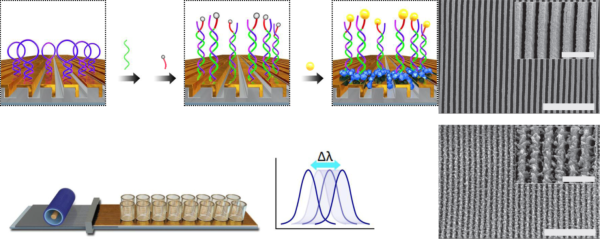Discrimination of single nucleotide mismatches using a scalable, flexible, and transparent three-dimensional nanostructure-based plasmonic miRNA sensor with high sensitivity
- Journal
- Biosensors and Bioelectronics
- Vol. (No.), pp.
- 113, 39-45 (Aug 2018)
- Year
- 2020-2014
Localized surface plasmon resonance (LSPR) biosensors have attracted much interest due to their capacity for multiplexing, miniaturization, and high performance, which offers the potential for their integration into lab-on-a-chip platforms for point-of-care (POC) diagnostics. The need for microRNA (miRNA)-sensing platforms is particularly urgent because miRNAs are key regulators and biomarkers in numerous pathological processes and diseases. Unfortunately, however, development of such miRNA-sensing platforms has not yet been achieved. In order to realize the detection of these important biomarkers, there has been an increasing demand for POC-sensing platforms that enable label-free quantification with low sample consumption, good sensitivity, real-time responsiveness, and high throughput. Here, we developed a highly specific, sensitive LSPR miRNA-sensing platform on a flexible, scalable plasmonic nanostructure to enable single-base mismatch discrimination and attomole detection of miRNAs in clinically relevant samples. The hairpin probe contained a locked nucleic acid (LNA) that enabled the discrimination of single base mismatches based on differences in melting temperatures of perfectly matched or single base mismatched miRNAs when they formed base pairs with probes. In addition, through hybridization induced signal amplification based on precipitate formation on the gold surface through the enzyme reaction, we observed a dramatic LSPR peak shift, which enabled attomole detection. Additionally, our LSPR miRNA sensor enabled the detection of miR-200a-3p in total RNA extracts from primary cancer cell lines without purification or labeling of the miRNA. This label-free and highly specific miRNA sensing platform may have applications in POC cancer diagnostics without the need for gene amplification.


